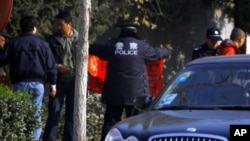Tax authorities in China have refused to accept any money for a deposit that famous activist artist Ai Weiwei must pay in order to lodge a formal appeal to a huge tax bill he was served nearly two weeks ago. That deposit would have included money contributed in recent days by thousands of his supporters, some of whom have been subjected to police harassment.
Ai Weiwei's lawyer, Pu Zhiqiang, says the artist was preparing to pay a guarantee bond required by the tax bureau to formally appeal the more than $2 million bill for back taxes.
Pu says Ai was not preparing to pay the entire fine today, but was preparing the money and the paperwork for the appeal. Then he received a call from tax authorities saying they would not accept it.
Pu says he does not know what the reasons are, but says the officials are not acting legally. He says the deadline for action on the bill is Wednesday.
Efforts to contact the tax bureau were not successful.
Ai Weiwei is required to pay a deposit of more than half of his $2.4-million tax bill in order to obtain an administrative review of his case. He has raised more than what he needs to request an appeal, from supporters, who have been sending him money any way they can.
Those who live farther away make bank transfers, while some who come in person fold banknotes into paper airplanes to fly over the walls of his compound.
This kind of campaign is rare for Chinese dissidents because of the threat of retaliation that comes with supporting high-profile government critics.
Liu Chunxia, 50, went with a friend to Ai's compound in the outskirts of Beijing Sunday afternoon.
Liu says she gave some money and then was nabbed by the uniformed and plainclothes policemen who were waiting outside the door of Ai's house. She said she was put on a bus with about 14 other detainees. She said they were driven to a detention center where there were 10 more Ai Weiwei supporters. She says the ones who cooperated just showed their ID cards and were let go. She said she did not cooperate, so she and some of the others were driven to a detention center on the other side of the city, where they were held for a few more hours. She says she was the last one of her group to be set free.
Her ordeal lasted nearly 12 hours, from three in the afternoon to three in the morning.
The Foreign Ministry is the only Chinese government agency that has regular contact with journalists. At a regular briefing Monday, spokesman Liu Weimin said he is not aware of the details of Ai's case.
The spokesman urged people not to read any other meanings into the tax authorities' decision, and said he hopes the incident will be settled according to law.
Ai is best known for helping to design the centerpiece of the 2008 Beijing Olympics, the Bird's Nest stadium. He became a vocal critic of the government following the 2008 Sichuan earthquake, when he took up the cause of the thousands of children who died when their shoddily built schools collapsed.
Earlier this year, he disappeared into police custody for more than two months. More recently, authorities served him with the huge tax bill. Ai has denied any wrongdoing, and says he is being persecuted for his outspoken support of free expression.
The artist has said he is treating the contributions from his supporters as loans that he will repay.
China Tax Office Refuses Artist Activist's Appeal Money
- By Stephanie Ho













